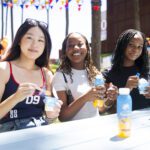The Bankwest Curtin Economics Centre in collaboration with The Australian National University (ANU) Centre for Aboriginal Economic Policy Research, the Kimberley Institute and the Yawuru community, today released a report that demonstrates the importance of measuring Indigenous wellbeing from the ground up.
The new report, Community Wellbeing from the Ground Up: A Yawuru Example, has sought to understand what constitutes a good life for Yawuru people and what aspects are important for their wellbeing.
The Yawuru people are the traditional owners of the lands and waters in and around Broome.
Report author, Mandy Yap from the ANU Centre for Aboriginal Economic Policy Research, said there was a tendency to enforce orthodox measures of wellbeing to represent the diverse experiences across Indigenous cultures.
“But what is deemed a comfortable, healthy or happy life will differ from person to person depending on their cultural background and life circumstances,” Ms Yap said.
“Depending on how we define and understand wellbeing, the type of indicators and measures used to represent and monitor wellbeing progress are also likely to differ.”
Report co-author, Eunice Yu from the Kimberley Institute, said the approach taken in this research is one that starts from the ground up and starts with Indigenous worldviews.
“It involves Indigenous participation and decision-making through the entire research journey,” Ms Yu said.
“The purpose of developing indicators of wellbeing for Yawuru is to determine how Yawuru are faring according to their own benchmarks and standards.
“The findings from the Yawuru wellbeing survey show there are many factors that contribute to achieving and maintaining wellbeing for Yawuru, but particularly connectedness to culture, country and family and self-determination.”
The findings highlight the integral role ‘connectedness’ plays to Yawuru wellbeing – starting in early childhood – with more than 90 per cent of Yawuru being taught to fish and hunt, and this knowledge is passed through generations.
Nyamba Buru Yawuru Chief Executive Officer Peter Yu said the findings of the Yawuru wellbeing survey will be a critical analytical tool in Yawuru decision making regarding investment for social and cultural development into the future.
“Yawuru have devoted resources to the revitalisation of language, reconnection of culture, management of waters and lands, improved housing for our people, building the capacity of our youth and caring for our senior people. The survey findings will help determine the success of Yawuru native title rights,” Mr Yu said.
The report: Community Wellbeing From the Ground Up: A Yawuru Example will be launched in Broome at The Civic Centre on Friday 12 August. The report can be downloaded from the Bankwest Curtin Economics Centre website.
Key findings of the report include:
- More than 93 per cent of Yawuru men and women consider their connection to family to be ‘strong’ or ‘very strong’. This strong connection is evident in the frequency of contact with family and friends and the ability to get support when needed.
- More than 90 per cent of Yawuru learnt to hunt and fish as a child and the majority of them continue to practice hunting and fishing today and pass that knowledge on.
- The connection to country and culture also has implications for standard of living. About 51 per cent of Yawuru women and men stated that in the last month, half or all of the fish and meat that they ate were either given to them or caught by them.
- One in every four respondents aged 45 years and over described having learnt Yawuru language as their first language during their childhood.
- The resources that Yawuru has put in to revitalisation of language has led to over 60 per cent of those who have children or grandchildren stating that the children or grandchildren were learning Yawuru at school and/or outside of school.
- Having autonomy is important for Yawuru wellbeing. Around 88 per cent of Yawuru reported having total control or quite a lot of control over their own life.
- Across the standard subjective wellbeing measures like life satisfaction, the majority of Yawuru men and women report feeling satisfied or very satisfied with their life overall. Yawuru women were twice as likely to report being very satisfied with their life overall than Yawuru men – 44 per cent compared to 23 per cent
- For Yawuru, identity and the strength of the inner spirit is important for their wellbeing. Four in every five Yawuru women and men reported feeling proud and confident of their identity and 60 per cent of Yawuru women report that their inner spirit felt strong, balanced and clear all or most of the time.


